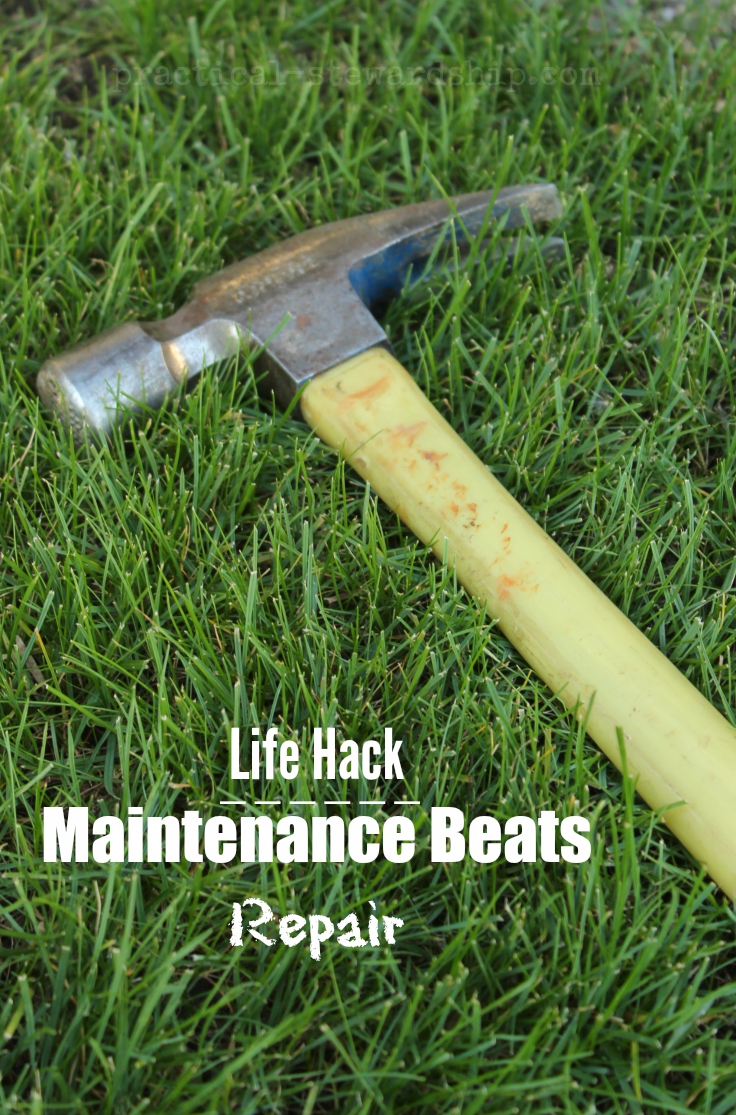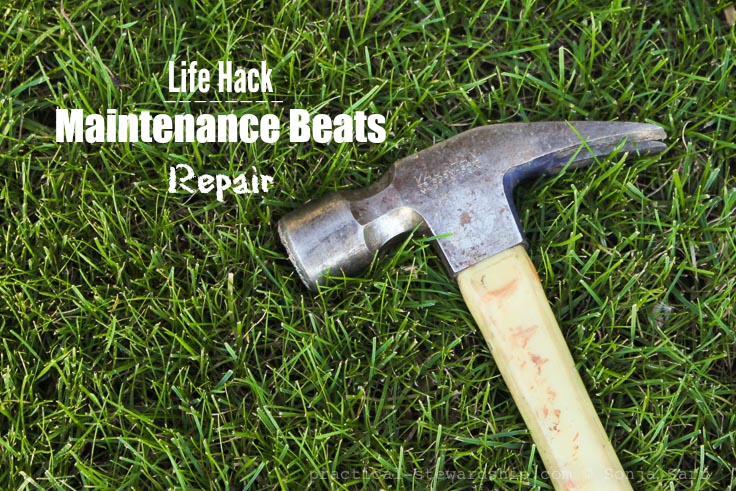Life Hack: Maintenance Beats Repair

A few years ago I sold a car. It was a Mazda 626, and it’d been having a few transmission problems, but we mostly just needed a car with more space, so we sold it. Well, before I sold it, I got that car running like a top, and I was wishing I could hold on to it! If you’ve ever fixed up a car (or a house) to sell, you’ve probably had similar feelings: “Why couldn’t I make it this nice a long time ago so I could enjoy it?”
It really is strange. If it cost me $1000 in repairs to get that car ready to sell in 2006, why couldn’t I have spent that $1000 (or probably less if they were maintenance rather than repair prices) in 2003 and have enjoyed those three years of fun driving, netted the same number of dollars spent, and then sold the car? Well, I didn’t have to spend the money until 2006, so I didn’t.
The reality is, we are motivated to action most powerfully by external forces.
“The boss needs that report by noon, so I’ll be unavailable beforehand.” “The wedding is in six weeks and I have to fit into that dress, so pass the carrot sticks.” “My doctor said I’m at serious risk of having a heart attack, so out come the walking shoes.” “The baby’s due date is three weeks out, and that nursery still needs paint, so I’m off to the paint store.”
The list of scenarios is endless, and we’ve all experienced a sentiment like one of these before. But since we’re not inclined to act until and unless we have to act, then we tend to also adopt an “if it ain’t broke, don’t fix it” mentality related to some really important things, like our our health and our finances.
And it gets worse! In this age of microwave results, lost is the appreciation for the value of waiting. A lot goes on under the soil between when a farmer plants winter wheat and when he sees the first green shoots. My kids don’t know what film for a camera is or what it does; they’ve always seen pictures immediately after they’ve been taken. With the increasingly efficient spread of information comes an intolerance for delayed gratification! A culture that wants to reap today what was sown only yesterday will be hard to convince to eat more broccoli today…especially when liposuction is a viable and convenient alternative tomorrow. Turns out, maintenance can be a tough sell.
So in light of all of this, I invite you to consider with me a ubiquitous principle, a life hack if you will:
Maintenance Beats Repair.
Now, if you’re anything like me, you read something like that and think, “Oh yeah?! What about salvation? What about car accidents? What if your house is sucked up in a tornado? Can maintenance have prevented that?” Well, as with any principle, there are exceptions, but I’m talking about general trends with how God works. I suggest then, that maintenance beats repair about 95% of the time.
I’ll suggest a few examples, then you can apply the principle as broadly as you’d like afterward.
Maintenance Beats Repair of Your Car
I already mentioned a car earlier, so why not run with it? A typical oil change costs about $30. Maybe half that if you do it yourself at home. If you don’t change the oil and filter, you will eventually destroy your engine. A $1000 engine repair (or rebuild or replacement) costs a lot more than a bunch of $30 oil changes. Plus the car will run better and last a lot longer.
Having your tires rotated will make them last a lot longer. Your tires’ warranty requires it. If you don’t do it, they’ll wear out unevenly and prematurely, costing you far more in the long run. Plus the car will run smoother and get better mileage.
Washing your car is good for the paint. It keeps damaging crud, bugs and grime from collecting even more crud, bugs and grime. Your car’s paint will last longer. Plus it’ll be much nicer to look at.

Maintenance Beats Repair of Your Finances
Saving a little bit each moth and accruing interest is better than deciding at age 67 that you need a lot of money. And when you’re 67, where is that money going to come from?
Staying out of debt is a whole lot easier than getting out of debt. Credit card companies make it really easy for you to be indebted to them for a very long, expensive time. I can pay the minimum on my credit card with one click; paying the full balance takes three steps. There’s a reason for this. They want for it to be hard for you to not owe them money. Nevertheless, by being in the habit of not carrying a balance, staying out of debt becomes relatively easy. You can read here how we paid off $16,000 in 16 months.
Maintenance Beats Repair of Your Body
I find the whole weight-loss industry and idea in the United States fascinating. We are a culture that has been so lavishly blessed by God that we have excess everywhere! So while many in the world are starving, the weight-loss industry here is a multi-billion-dollar phenomenon. And our principle applies here, too!
Most people find that gaining weight is easy; losing weight is hard. We eat so much that all you have to do is nothing and you’ll gain weight. And easy come, easy stay. It doesn’t go away without discipline and hard work.
Perhaps you’ve been injured. Rehab is a bummer, right? Sometimes injuries are unpreventable…but sometimes they’re the product of foolishness and a failure to take care of yourself. Stretching, warmups, cool downs, proper exercise technique…they’re all means to optimize performance and help to stave off injury.
(NOTE: I did a whole post on Maintaining Your Fitness, in case you’re interested.)
What about diet? Once you’ve learned how great it can feel to eat well, maintaining a healthy diet is a whole lot better than repairing a cruddy one.
And if you don’t cultivate good maintenance habits today, it’ll only be harder tomorrow, and pretty soon you find yourself in repair mode, wondering how you got there.
Again, these are only examples, but I’m sure you get the idea.
Briefly, let me offer one takeaway that I think is helpful to remember in all this:
Our Actions Affect Others
If I get rear-ended at a stoplight, that’s probably not the result of my failure to change my car’s motor oil regularly. But it may well be the result of the other guy’s neglect of his paper-thin brake pads.
An insurance company will offer different premiums to a group of young healthy people than to a group of septuagenarian chain smokers. And the one outlier in each group will feel the impact of the decision making of the others.
When we routinely make good decisions, this has a positive affect on those around us. In far-reaching ways, maintenance and other practices of excellent stewardship enable us to better love and serve others.
From appliances to dull lawnmower blades to furnace filters to Bible reading plans, maintaining something important is a whole lot better than letting it go until it needs attention. You get better results/performance. You save time, money, and energy. You also enjoy a better quality of life than when you’re constantly having to fix something.
How about you? Does this principle resonate with you? Where have you seen it break down? Leave a comment and let us know.